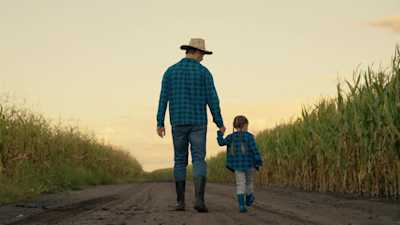What happens if you don’t have a will - by province

When a farmer dies without a will, the door opens to an array of issues for friends and family to deal with, including two critical questions: who benefits from the estate and who administers it?
How these questions are answered, while in many ways similar, differ between provinces.
British Columbia
According to John Becker of Peak Law Group LLP, dying without a will in B.C. leaves the Wills, Estates and Succession Act to determine the transfer of property. Generally, the government distributes the estate along the lines of the deceased’s family tree, with special rights for spouses, but that’s only when the property is registered solely in the name of the deceased.
If the property is registered as joint ownership, the title passes to the surviving owner. It’s common for spouses to hold farm property in joint tenancy, though less so between parents and children.
Probate fees – the cost to appoint a legal trustee – are assessed by the province. The calculation is roughly $14 per $1,000 of value. However, when setting the amount, the province’s assessment value can be used to ensure the estate is held at or below market value. A certified appraisal can be done to reduce the value of the property and thus the probate fees if the estate administrator feels that the assessment value was initially too high.
Alberta
Without a will in Alberta, the entire estate generally goes to the surviving spouse or adult interdependent partner, explains Colin Simmons of Counsel West Agricultural Lawyers in Calgary. That’s how it works whether the couple has children or not.
However, if the deceased or surviving partner also has children from a different relationship, the share awarded to the surviving partner is either 50% of the estate, or $150,000, whichever is greater. Alberta’s Wills and Succession Act dictates how the rest is distributed in this and all other scenarios.
Saskatchewan
Sheena Metzger, Osman & Company Law Office says the Administration of Estates Act determines who can administer the estate after the death of someone without a will. This generally starts with the spouse of the deceased. However, if the spouse cannot act, all children must agree which of them will be an administrator. If this is not possible, the same process applies in descending order to other layers of the family – and potentially to those outside the family.
With both a surviving spouse and children, the spouse is entitled to $100,000 of the estate, plus a share of the remaining value. Without a spouse, the estate is divided among children. If a farmer passes away with no immediate family (spouse, children, parents, siblings, or nieces and nephews), the estate will pass to other next-of-kin.
Whoever is applying to be the estate administrator needs to have evidence of what the deceased person had for assets at the time of death. However, this information can be difficult to gather since some institutions are reluctant to give such information to an individual if they are not already the legal administrator.
Updating your will doesn’t have to be daunting. Tackle this important task using our custom tools and resources.
Manitoba
In Manitoba, estates are divided based on a hierarchy of beneficiaries, explains Laura McDougald-Williams, Meighen Haddad LLP. This starts with a spouse who receives the entire estate. After that is existing children, then all other members of the family in a descending order. Marital separations can make the hierarchy of beneficiaries less clear.
As in other jurisdictions, the government is granted the entire estate if no living relative can be found.
Who administers the estate is determined by the those qualified as beneficiaries. This involves agreeing upon and nominating an individual, then applying to the court for approval.
Ontario
According to Robert Fuller, Brimage Law Group, dying without a will means a trustee needs to be appointed to move forward. This, however, involves applying to the court for what’s called a certificate of appointment of estate trustee without a will, and comes with a 1.5% fee for anything over $50,000.
If there are no children, the spouse gets the entire estate. When there are children, the spouse receives the first $350,000, and anything more split between the spouse and the children. With one child, the split is 50/50. More than one living child means the spouse receives one-third, and the other two-thirds goes to the children. Money granted to children under 18 years goes to a public guardian trustee. That trustee writes the child a cheque once they come of age.
All further estate distribution circumstances and regulations are covered by the succession law reform act.
Quebec
According to Éducaloi, a charity dedicated to explaining Quebec law in everyday language, with no will, heirs will be responsible for settling affairs and will need to make the selection themselves by majority vote. That person, the liquidator, will be required to have agreement from all heirs before making many decisions involved with settling the estate.
The Civil Code of Quebec states that common-law spouses, regardless of how long the relationship was, are not considered heirs and thus cannot inherit when there is no will. Civil or married spouses are protected, however, though that protection varies according to the family situation.
Overall, the Civil Code specifies potential heirs and distribution based on the deceased's family situation.
New Brunswick, Nova Scotia, P.E.I., Newfoundland and Labrador
Without a will in any of the four Atlantic Canadian provinces, solely-owned assets (whether land, equipment or a house) are distributed as the applicable provincial law dictates. According to Catherine Watson Coles, McInnes Cooper Estates & Trusts, specifics vary depending on the province, but in general, the spouse receives a set amount before sharing the rest with children, if any exist. Common-law partners do not qualify as spouses. Further distribution is granted according to a hierarchy of next-of-kin.
Ownership of any assets owned as a joint tenant will pass to the surviving joint tenants. If the farm is incorporated, assets will include shares in the farm corporation (and therefore shares of the ownership of the assets the farm corporation owns), unless there’s a shareholders’ agreement setting out what happens to the shares when a shareholder dies.
Dying without a will also means lost opportunity to make good tax plans, such as access to unique tax-rollover options, or manage other potential liabilities and costs like probate fees. Also lost will be the opportunity to plan for special circumstances like disabled beneficiaries or blended families.
Updating your will doesn’t have to be daunting. Tackle this important task using our custom tools and resources.
Bottom line
The implications of dying without a will vary across the country. In general, no will means more expenses for survivors. Knowing the nuances of your province’s estate law regulations can save survivors money.
Article by: Matt McIntosh
Disclaimer
This article briefly summarizes select general aspects of estate law in the provinces. It is meant for informational purposes only and should not be used or interpreted as legal advice. Consult legal professionals in your own provincial jurisdiction before taking any legal action.

Financing that's farm-ready
Whether you’re upgrading, expanding or getting started, we have options built for you.
Explore financingExplore financing options
Dr. Tom Deans, Intergenerational wealth transfer expert, shares common myths about will and estate planning and how to overcome them.
